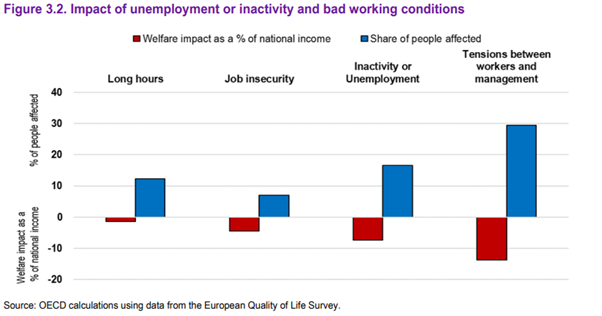OECD finds better jobs give as much life satisfaction as increasing national income by a quarter
17 October 2023
A new OECD report published today, ‘How to make societies thrive?’, describes how job instability and poor working conditions can lead to increased fatigue, risk of burnout or depression and declining mental health. It finds that people at risk of mental health problems are 3 times more likely to be dissatisfied with their job. The report recommends governments to adopt policies that can improve mental health and other well-being outcomes.
TUAC stresses the key role that well-being at work plays in overall well-being. Another recent study by the OECDs Well Being, Inclusion, Sustainability and Equal Opportunity Center (WISE) provides remarkable conclusions.
Using data from a European survey on the quality of life in 2003-2016, the OECD analysis quantifies how good working conditions shape life satisfaction compared to household income. The OECD found that being employed gives as much satisfaction as a 13% increase in household income. Non-wage conditions are also crucial: high job insecurity, with workers expecting to be losing their job within the next six months, depresses life satisfaction as much as losing 52% of household income. Other factors at work reducing life satisfaction are tensions with management and working more than 49 hours a week.
The OECD also found that eradicating long working hours and job insecurity and improving relations between management and workers, together with reducing unemployment or inactivity, can increase life satisfaction as much as adding one additional quarter to total national income (see graph).

“High employment and good working conditions together with the absence of tensions between management and workers are important for the well-being of societies, Governments need to promote effective industrial relations systems and strong trade unions and employer organisations to improve the quality of life of workers.
"Contrary to many Central Bankers who want to fight inflation by increasing unemployment, high employment is a good thing for well-being as well as for economic activity and Government tax revenue.”
